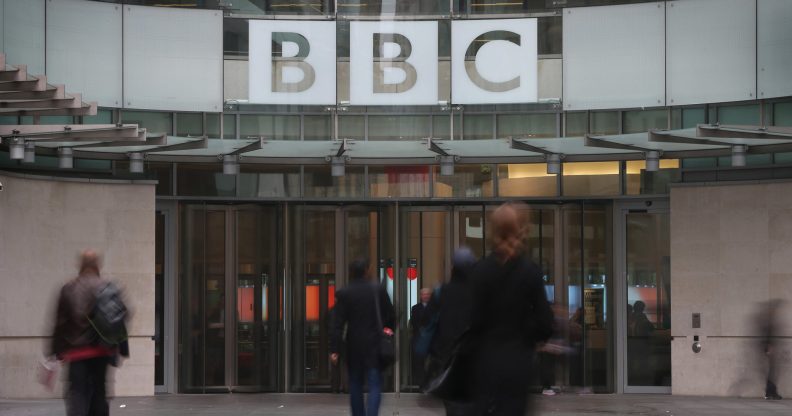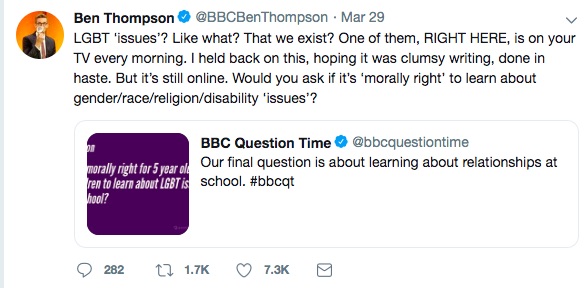BBC tells staff not to tweet personal views after LGBT Question Time backlash

The BBC Editorial Policy Department was today sent a letter by the UK’s 10 biggest LGBT+ groups who have united in support of the transgender community. (Peter Macdiarmid/Getty)
The BBC has told all its new staff that they could face internal sanctions for expressing their personal views on Twitter, after a number of employees publicly criticised the corporation for presenting LGBT+ rights as a debate.
It comes after high-profile employees, including BBC Breakfast presenter Ben Thompson, hit-out at the BBC’s Question Time for letting an audience member ask if it is “morally right that five-year-old children learn about LGBTQ+ issues in school.”
The current affairs show, hosted by Fiona Bruce, debated LGBT+ inclusive education after protests organised by conservative Muslim parents at schools in Birmingham and Manchester, which were first staged outside Parkfield Community School over its No Outsiders programme.
On Thursday (April 4), Fran Unsworth, director of news at the BBC, threatened that staff could face “appropriate action” if they did not follow editorial guidelines, including refraining from sharing their personal views on social media, reports the Guardian.
BBC head of news tells staff to keep personal views “private”
In an email sent out to news staff, obtained by the Guardian, Unsworth said: “We all have personal views, but it is part of our role with the BBC to keep those views private.
“Our editorial guidelines say BBC staff must not advocate any particular position on a matter of public policy, political or industrial controversy, or any other ‘controversial subject’.
“That applies to all comments in the public domain, including on social media.
“There is no real distinction between personal and official social media accounts.”
BBC director of news says to employees not to tweet about any “controversial subject”
Unsworth went on to say that “ignoring these rules risks undermining the BBC’s reputation, particularly given our renewed focus on impartiality.”
Following the Guardian’s new report on Unsworth’s email, Thompson tweeted to his followers: “Thank you for all your messages.”
BBC’s Question Time was widely criticised after it presented LGBT+ rights as a morality-based question in its show on March 29.
“Our editorial guidelines say BBC staff must not advocate any particular position on a matter of public policy, political or industrial controversy, or any other ‘controversial subject’.”
—Fran Unsworth, director of news at the BBC
Taking to Twitter on March 29, Thompson wrote: “LGBT ‘issues’? Like what? That we exist? One of them, RIGHT HERE, is on your TV every morning.
“I held back on this, hoping it was clumsy writing, done in haste.
“But it’s still online. Would you ask if it’s ‘morally right’ to learn about gender/race/religion/disability ‘issues’?”

BBC presenter Ben Thompson criticised Question Time on Twitter.
Labour MP Wes Streeting tweeted in response: “Next week: our final question is about learning about women at school. ‘Is it morally right for 5 year old children to learn about women’s issues in school?’ Week after: ‘is it morally right for 5 year old children to learn about Muslim issues in school?’.”
He added: “Get in the sea.”
BBC presenter Sue Perkins said: “The framing of this question is deeply worrying. Are we really here again, nearly two decades after Section 28 was repealed…?”
Holby City actor David Ames wrote: “This is deliberate phrasing and it’s not only insulting but damaging.
“I hope the increase in heated Tweets/responses to this is worth the suggestion that learning of the mere existence of a minority is immoral.”

